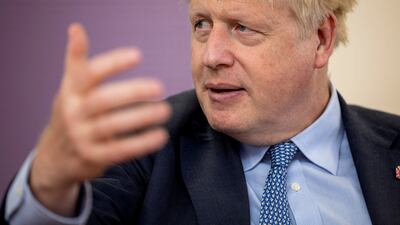British Prime Minister Boris Johnson is facing a drip feed of pressure to resign over the “partygate” controversy as more Conservative MPs write letters of no confidence.
He is also under fire from the opposition Labour Party, which is angry at Mr Johnson’s move to change — they say weaken — the rules on when ministers must resign.
Mr Johnson is facing an inquiry by the Commons Privileges Committee into whether he misled Parliament over partygate. The scandal comprise a series of allegations that a number parties took place across No 10 Downing Street and other government buildings during the Covid-19 pandemic, when public health restrictions prohibited most gatherings.
Labour wants a vote in the House of Commons on the changes to the Ministerial Code, which would mean other sanctions become available for MPs who break the rules. These include “some form of public apology, remedial action or removal of ministerial salary for a period”.
Labour Party chairwoman Anneliese Dodds said as long as Mr Johnson is in power, “working people are paying the price” for a government "in chaos”.
Asked about the report on No 10 parties by senior civil servant Sue Gray, she told Sky News’s Sophy Ridge On Sunday programme that Mr Johnson's response "has been to try to actually change the rules that he will then be judged by because he’s seeking to water down the ministerial code".
On Sunday, the government denied newspaper reports that pressure had been put on Sue Gray, the senior civil servant chosen to investigate the partygate allegations, in a failed effort to remove certain details and names.
Discontent in the Conservative ranks is growing because MPs fear they may lose their seats over fallout, said David Davis, a former Cabinet minister and critic of Mr Johnson.
Two more Tory MPs have joined the list of MPs known to have handed in letters of no confidence in the prime minister.
Former health minister Steve Brine and Anne Marie Morris are the latest MPs to write letters.
A former Conservative Party chairman said on Sunday that he did not think Mr Johnson would face a no-confidence vote, despite a steady stream of MPs calling for one.
“I don’t think he will, actually," said the Northern Ireland Secretary Brandon Lewis.
“I don’t think it is in the interests of the country, I don’t think it is in the interests of the Conservative Party."
Sir Graham Brady, chairman of the 1922 Committee of backbench Tories, will be obliged to order a no-confidence vote if he receives 54 letters demanding one.
More than 20 MPs have publicly stated that they no longer support Mr Johnson, but more may have written letters given that the process is secret.
The prime minister's changes to the Ministerial Code mean that ministers would not automatically lose their jobs if they break the rules, as has traditionally been the case.
A government policy statement said it was “disproportionate” to expect ministers to resign or face the sack for “minor” violations of the code.
Labour leader Sir Keir Starmer plans to force a debate on the changes. He has asked MPs to enshrine the commitment that ministers who commit serious breaches of the code must resign.
Deputy leader Angela Rayner said the prime minister's new foreword to the code had removed “all references to integrity, objectivity, accountability, transparency, honesty and leadership in the public interest”.
Mr Johnson faces an inquiry by the Commons Privileges Committee into whether he misled Parliament with his regular reassurances that coronavirus rules were upheld at No 10 during England's lockdowns.
Claims in The Sunday Times that details of an alleged Downing Street flat party were removed from Ms Gray's investigation into coronavirus rule-breaking have been denied by No 10 sources.
“It is untrue that anyone on the political side saw anything in advance or sought to influence it,” one told the UK Press Association news agency.


